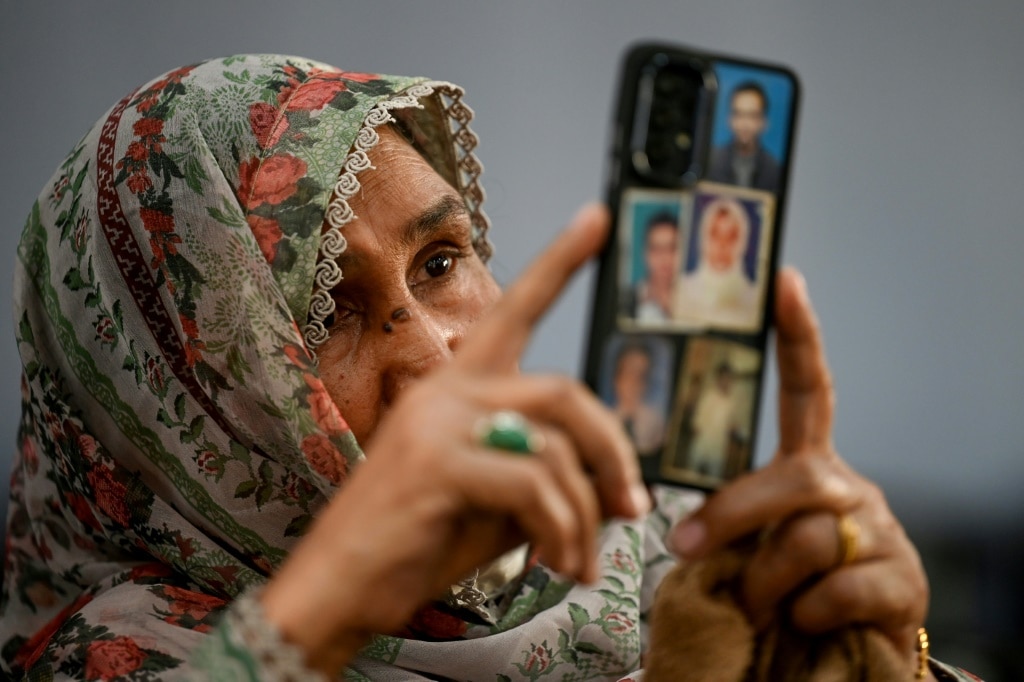Pakistan 'vigilantes' behind rise in online blasphemy cases
Pakistan 'vigilantes' behind rise in online blasphemy cases

Aroosa Khan's son was chatting on WhatsApp but suddenly found himself the target of "vigilante" investigators who accused him of having committed blasphemy online, a crime that carries the death penalty in Pakistan.
The 27-year-old is one in hundreds of young men standing trial in Pakistan courts accused of making blasphemous statements online or in WhatsApp groups, an offence for which arrests have exploded in recent years.
Many of the cases are being brought to trial by private "vigilante groups" led by lawyers and supported by volunteers who scour the internet for offenders, rights groups and police say.
The families of young Pakistanis, including doctors, engineers, lawyers, and accountants, say that their relatives were duped into sharing blasphemous content by strangers online before being arrested.
"Our lives have been turned upside down," Khan told AFP, saying that her son, who has not been named for security reasons, had been tricked into sharing blasphemous content in the messaging app.
One local police report suggests that the vigilantes may be motivated by financial gains.
One such group was responsible for the conviction of 27 people who have been sentenced to life imprisonment or the death penalty over the past three years.
Blasphemy is an incendiary charge in Muslim-majority Pakistan, where even unsubstantiated accusations can incite public outrage and lead to lynchings.
While they date back to colonial times, Pakistan's blasphemy laws were ramped up in the 1980s when dictator Zia ul-Haq campaigned to "Islamicise" society.
AFP has attended multiple court hearings in the capital Islamabad, where young men are being prosecuted by private vigilante groups and the FIA for blasphemous online content.
Among them is Aroosa's son -- who had joined a WhatsApp group for job-seekers and was contacted by a woman.
She sent him an image of women with Quranic verses printed on their bodies, his mother said, adding that the contact then "denied having sent it and asked Ahmed to send it back to her to understand what he was talking about".
He was later arrested and prosecuted by the Federal Investigation Agency (FIA).
- 'Noble cause' -
The most active private investigation group is the Legal Commission on Blasphemy Pakistan (LCBP), which told AFP they are prosecuting more than 300 cases.
Sheraz Ahmad Farooqi, one of the private investigation group's leaders, told AFP that more than a dozen volunteers track online blasphemy, believing that "God has chosen them for this noble cause".
"We are not beheading anyone; we are following a legal course," Farooqi told AFP outside a courtroom that heard 15 blasphemy cases, all filed by his group.
He said that most of the accused were addicted to pornography and were disrespecting revered Islamic figures by using their names and dubbing voices attributed to them over pornographic content.
He acknowledged that women were involved in tracking and arresting the men, but they were not members of his group.
Cases can drag through the courts for years, though death penalties are often commuted to life in prison on appeal at the Supreme Court and Pakistan has never executed anyone for blasphemy.
A special court, attended by AFP, was formed in September to expedite the dozens of pending cases.
- 'Vested agenda' -
The Human Rights Commission of Pakistan (HRCP) reported that multiple vigilante groups were working in a "dedicated manner" to "witch-hunt" people for online expression or to fabricate blasphemy evidence using social media with "vested agendas".
"All such groups are formalised by self-declared defenders of majoritarian Islam," the group said in a report published in 2023.
A 2024 report by police in Punjab province, the country’s most populous province, that was leaked to the media said that "a suspicious gang was trapping youth in blasphemy cases".
"The Blasphemy Business" report was sent to the FIA with recommendations to launch a thorough inquiry to determine the source of the vigilante groups' funding.
Two FIA officials, speaking on condition of anonymity, told AFP that they had received the report but denied that their office was acting on the tips of vigilante groups.
The FIA did not respond to requests for official comment.
An official involved in prosecuting the cases told AFP outside the court: "Not a single person arrested was trapped by any manner. They committed the crime."
"The law is very clear about it, and we have to enforce it as long as the law is there."
Arafat Mazhar, the director of Alliance Against Blasphemy Politics, a group advocating against the misuse of blasphemy laws, told AFP that the alarming rise in cases was not because people "are suddenly more blasphemous".
He said the rise in the use of messaging apps and social media and the ease of sharing and forwarding content was a significant factor.
- Shunned -
The accused struggle to find defence lawyers willing to represent them and the slightest accusation can turn an entire family into pariahs.
Nafeesa Ahmed, whose brother is accused of sharing blasphemous images on WhatsApp and whose names have also been changed, said her family was shunned by close relatives.
"There is a massive cost that families of accused are bearing. First of all, our security or lives are at risk," she told AFP.
She said some of the families have sold thousands of dollars worth of houses and gold, given to brides on their wedding, to fight the cases.
Dozens of families which have formed a support group have protested in the capital calling for an independent commission to investigate the vigilante groups and their role in prosecuting Pakistanis for blasphemy.
"In this society, if someone commits a murder, he can survive because there are thousands of ways to come out of that but if someone is accused of blasphemy he cannot," said Nafeesa.
"When it comes to blasphemy, the public has its own court and even family members will abandon you."
zz/ecl/hmn/mca



